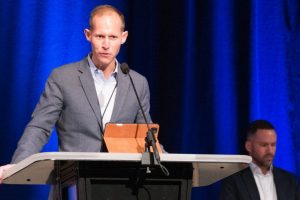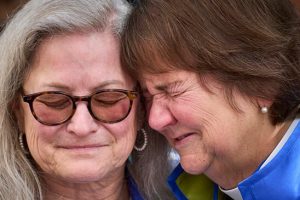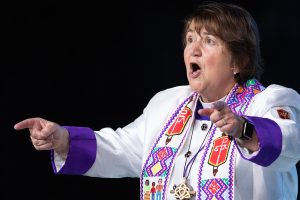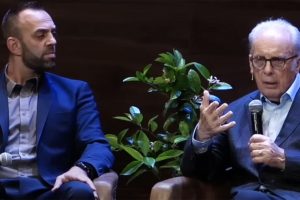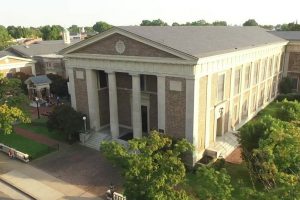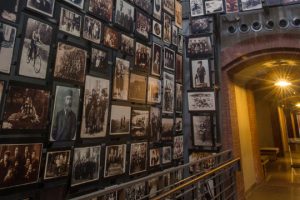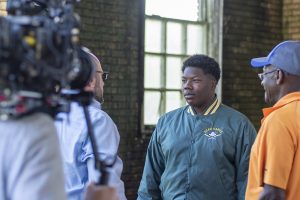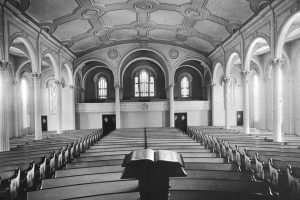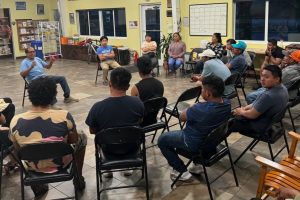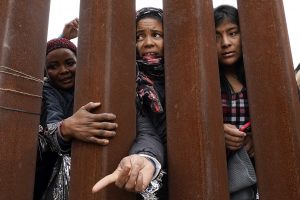 I have taken a number of groups to Israel and Palestine over the years so I often get asked to share slides and stories about my trips there. Recently at a local civic organization, I concluded my presentation with a few pictures of the Dome of the Rock in Jerusalem and the Temple Mount. This triggered an interesting interaction.
I have taken a number of groups to Israel and Palestine over the years so I often get asked to share slides and stories about my trips there. Recently at a local civic organization, I concluded my presentation with a few pictures of the Dome of the Rock in Jerusalem and the Temple Mount. This triggered an interesting interaction.
“What do you think of the new temple that will be built on the Temple Mount?” an older man in the audience asked.
“What new temple?” I asked in return.
“The one prophesied. The one that will be built for Jesus to come back!”
I was a little caught off guard. But I shouldn’t have been. “No, I don’t agree with it and I don’t think Jesus did either,” I said, maybe a little too firmly.
Another man chimed in: “It’s all in Revelation. It’s all in God’s plan and we need to be ready. And we need to support Israel so that we can be ready!”
Encounters like this reveal a troubling but popular theological perspective that Jesus never intended – at least according to the Gospels. Jesus viewed the temple of his day with considerable concern, and understood the temple as God originally intended: “a house of prayer for all people” (Isaiah 56:7; Jeremiah 7:11; Matthew 21:13). However, a considerable number of traditional Christians seem to have gravitated away from the Gospels.
This recently popularized perspective jumps right past what Jesus said and did and leaps right into the arms of a literalistic version of Revelation that views “end times” as a highly marketable concept for well-meaning Christians. Sadly, what is being peddled creates broad theological confusion and ultimately wreaks geopolitical havoc.
Learning something about the times we are in and the truth we overlook is as important now as it has ever been.
The Temple Mount in Jerusalem
This holy site has deep and rich history for Muslims, Christians and Jews. For Jews, it was the site of the ancient temple of Solomon, torn down by Nebuchadnezzar in 587 B.C., then rebuilt tentatively by Ezra and Nehemiah. It was succeeded by the larger and grander temple of Herod finished during and just after Jesus’ ministry.
Jesus strongly critiqued this controversial place, turned over the tables of the moneychangers and predicted it would be torn down in the not too distant future. It was. In 70 A.D., following the disastrous Jewish rebellion of 66-72 A.D., the Romans destroyed it. Later, under the Emperor Hadrian (117-138 A.D.), a Roman temple was constructed on the site, followed by The Dome of the Rock, completed in 691 A.D. This is the ubiquitous view we have of Jerusalem today, with photos taken from the Mount of Olives with the iconic Dome of the Rock in the background.
One of the most beautiful buildings in the world, as well as one of the most historic, the Dome of the Rock is the third holiest shrine in Islam. Its location on the Temple Mount is part of a unique relationship within Israel. The area of the Temple Mount is controlled by the Palestinian Authority, but it is protected and surrounded by the Israeli Defense Forces. This unusual relationship hints at the complicated nature of how fragile life in and around this holy site is. However, with understandable exceptions and natural misunderstandings, the tenuous relationship has essentially worked. It remains a fragile compromise that recognizes the value of an entire multiplicity of holy sites, Christian, Muslim and Jewish, both in Jerusalem and throughout Israel.
“The depth and breadth regarding the real issues at work in this beautiful, complex and ancient land require far more than an interpretation of a few speculative passages that likely meant far less than many big name preachers would like us to think.”
However, this very intricate and complicated arrangement for the world’s three largest monotheistic religions continues to be threatened by well-meaning but often poorly informed American Christians. The depth and breadth regarding the real issues at work in this beautiful, complex and ancient land require far more than an interpretation of a few speculative passages that likely meant far less than many big name preachers would like us to think. Like the two gentlemen who spoke up during my presentation, emotions among many conservative American Christians run high. This is in part because their pastors or influential TV preachers have given them information that sounds interesting and appears to fit into the detailed timelines people enamored with end-times theology like to use. But, as is often the case, life is not always that simple – especially in the Middle East.
Like the Temple Mount and The Dome of the Rock in Jerusalem, Israel itself poses significant complexities. Religious, political, ethical and geographical overtones play into every aspect of this intensely emotional issue of the land where Jesus lived. Arabs and Jews, Christians and Muslims, Israelis and Americans and the international community see this beautiful, deeply spiritual and badly divided part of the world through starkly different lenses.
Here are a few reasons:
The founding of Israel in 1947 was declared without asking the people who lived there. Called Palestinians, these were Arab men, women and families whose homes, villages, towns and cities had been handed down generation to generation over the centuries. Just emerging from forced rule by the Ottoman Empire following World War I and the British following World War II, the area of Palestine was filled with people of Arab descent who had been promised democracy and self-rule by the British (through Lawrence of Arabia, among others; the British also made similar promises to Jewish representatives in London in a document entitled “The Balfour Declaration.”) Many Jews lived among the Palestinians, but nowhere close to a majority. So the natural question quickly arose and echoes mightily still: How could a minority of Jewish immigrants suddenly force the majority Palestinians to obey new rules, to forfeit self-rule and to remain quiet while losing much of what should have remained theirs? But it happened.
Following the Holocaust and the horrors of World War II, the United Nations developed a partition plan to divide the land of Palestine into separate areas, one governed by a newly constituted state of Jewish people, the other to be run by Palestinians. The problem with this plan, though it appeared acceptable to many, was that no one had bothered to ask the Palestinians.
Thousands of innocent people would lose ancestral homes and land generations had loved and nurtured. I once asked for a show of hands in a class I was teaching: “Think of your home and family. Who of you would agree to move away from all that you knew – your house, your neighbors, your work, your church – to go to another state where you would have to start all over again?” In the class of 30, none would agree to such a plan.
So who could blame the Palestinians who suddenly found themselves living in a land that was no longer theirs? They refused to comply with the demands of a newly constituted outside group unconnected to and apparently unconcerned about what Palestinians would sacrifice. Yet resistance to this new normal placed them under immediate attack against a foe well-armed with the heavy guns and ammunition left over from the British occupation.
The founding of Israel displaced 3 million Palestinians. Many of the Arab inhabitants, both Christian and Muslim Palestinians, quickly fled, often with only what they could carry. They, like any of us, expected to be able to return to their homes once everything was safe and some kind of peace was negotiated. But there was no negotiation. Families, young and old, men, women and children ended up in refugee camps in Jordan, Lebanon, Syria, East Jerusalem and the West Bank. Forcibly pushed from what had been ancestral homes, they began a tenuous existence as second class citizens, unable to have passports and with no access to citizenship. They remained refugees with no way of returning to the homes they or their ancestors had built with their own hands.
Today, in the Gaza Strip and the West Bank, some refer to these areas as the largest refugee camps in the world. Though in the West Bank some creative development emerged within the sadness, the difficulty of coping with an ongoing refugee crisis continues. For the most part, the world has paid little attention, except for the Americans who insist upon supporting Israel no matter what that country’s leaders do or say.
“Americans – and America’s religious leaders and faith communities – can and should work against anything that smacks of anti-Semitism. But we need not be blindly pro-Israel any more than we should be anti-Palestinian.”
The Israelis who conquered the land continue to control the lives and destinies of over 2.5 million people in the West Bank, and 1.5 million people in Gaza. And though Gaza is not technically ruled by Israel, it is surrounded and periodically blockaded by Israel on three sides, and in the south, by Egypt. This little strip of land on the Mediterranean Sea is allowed no seaport, no airport and no free access to any other country in the world. The Palestinians who live here are captive to Israeli policy and political whims.
The West Bank, on the other hand, is occupied by Israel. That is why it is sometimes referred to as “Occupied Territory.” Not only surrounded by Israeli forces, the West Bank is a variegated matrix of military roads, checkpoints, walls and barbed wire. Palestinian families attempting to visit one another or initiating any effort at viable economic activity from town to town or village to village is a logistical nightmare. The Israelis also oversee all water sources in the West Bank. The Israeli national water carrier, Mekorot, has been given full control of all subterranean waters of the West Bank by the Israeli military. And as any military strategist knows, controlling water equals control of the population. Therefore, Israeli leverage over the 2.5 million Palestinians who live in the West Bank remains shockingly complete.
East Jerusalem has long been a vibrant Arab cultural center and historic home of Palestinian identity community pride. Since the Six Day War of 1967, Israeli policies increasingly tightened control of and leverage over the Palestinians of East Jerusalem. Jewish settlements, often subsidized by American monies pouring in yearly in the billions of dollars, continue to be established on confiscated Arab land. The resulting increase in Jewish population and displacement of Palestinian homes and residents multiplies resentment, anger, hopelessness and a sense of powerlessness. Some Israelis argue such policies are necessary to prevent Palestinian terror. However, others contend these strategies promote angry, sometimes violent and often tragic responses.
The same strategy of displacement and disempowerment, along with the strict control of water, roads and military checkpoints, continues to be used in the broader West Bank.
And there are further problems.
Jewish settlements are illegal. The United States, the United Nations and international law each declare that land “won” in war cannot be colonized, ethnically cleansed or in any other way controlled by the conquering power. Refugees from the war are to be allowed to return to their homes, and the land is to be restored to the rightful owner once peace returns. However, such has never been the case with Israel. Since 1947, Israel has wrestled with how to handle these displaced people. (Israel has never ratified a constitution because doing so would force Israelis to either offer Palestinians within Israel equal rights, or be on record for failing to do so. They would also be forced to resolve all the dangling inequities and tragic consequences of occupying the land of two and a half million people in the West Bank.)
Over the last 30 years, Israeli policy has increasingly relied upon “Jewish Settlements,” land confiscated from Arab Palestinians and turned over to Israeli developers for the “in-fill” of Jewish settlers (or colonists) to inhabit this formerly Arab land. Every country but the United States understands this continued policy of Jewish settlements is against international law.
In the Israeli Parliament, the ruling Likud party’s central committee recently and unanimously endorsed a resolution that calls for the annexation of all Jewish settlements in the West Bank. The party has been emboldened, it seems, by the declaration of the current U.S. president. U.S. recognition of Jerusalem as the official capital of Israel has now created a clear “pro-Israel” climate. Those in Israel who want Palestinians to give up and to go away now have the perceived support they believe they need. Ethnic cleansing of the troublesome people who have lived in the land for centuries has been the goal for many in the Likud party since this political party’s founding in 1973. (For helpful perspectives on this difficult topic, see Gary Burge’s Whose Land? Whose Promise? What Christians Are Not Being Told about Israel and the Palestinians and Ron David’s Arabs and Israel for Beginners.)
American approval and evangelical passion
Most of these strange, tragic activities perpetrated by Israel toward Palestinians – although broadly condemned in the international community – have occurred with tacit American approval. In spite of rhetoric and some policies promoting human rights and democracy around the world, America’s voice largely goes silent in the face of Israeli abuses. Why?
As demonstrated by the gentlemen viewing my slides, emotions run high around anything related to what many evangelical Christians would classify as the fulfillment of biblical prophecy. Whether about Israel, the Second Coming and “The End-Times” or what to do about the Palestinians in and around the modern country of Israel, these topics unleash a wave of highly charged opinions in certain Christian circles. Generally premised upon fascinating but often wildly unfair and inaccurate interpretations of scripture, they encourage an unabashedly pro-Israel stance and a passionate defense of land seizures.
Americans – and America’s religious leaders and faith communities – can and should work against anything that smacks of anti-Semitism. But we need not be blindly pro-Israel any more than we should be anti-Palestinian. We can hope for, pray for and continue to advocate for a land where Jesus walked to be truly a land of peace. Better biblical interpretation, along with better-informed and more accurate lessons in history and politics, will help.
Yes, it’s complicated. And it’s vitally necessary.


